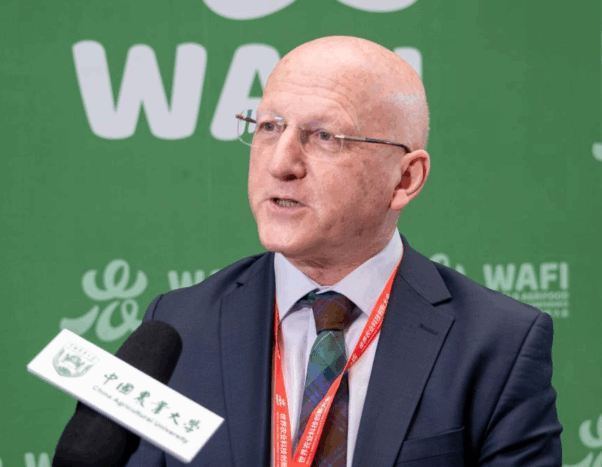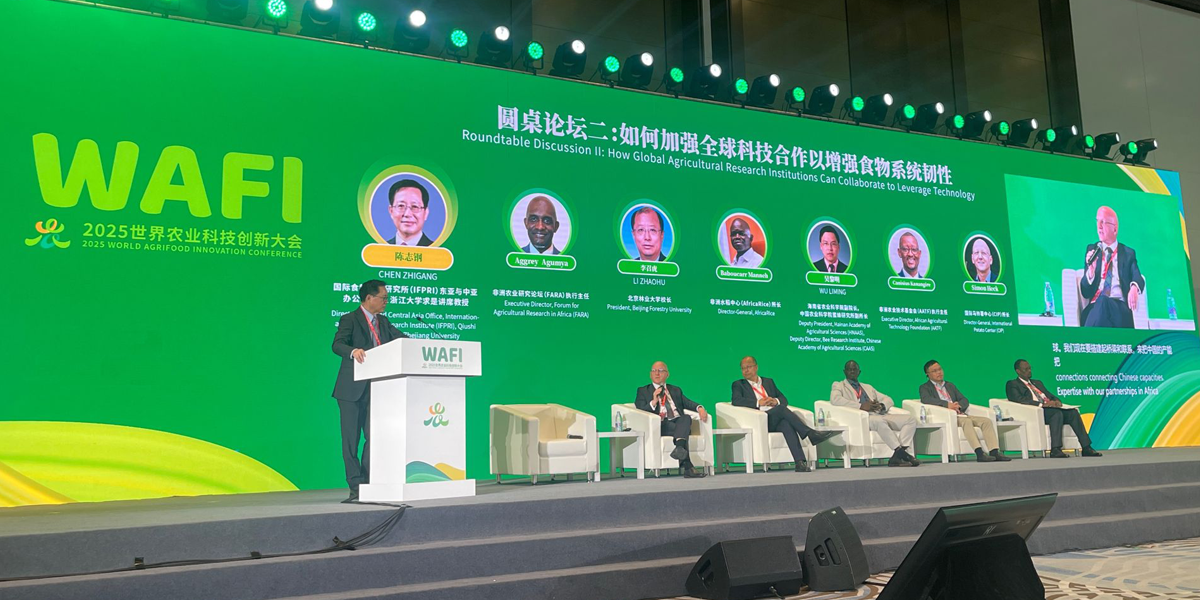From October 12th to 14th, Dr. Simon Heck, Director General of the International Potato Center (CIP), was invited to participate in the “Dietary Fiber Innovation Forum”, the “World Agricultural Scientists Symposium – Global Science and Technology Cooperation for Building Resilient Food Systems” and the plenary session on October 13th of the 2025 World Agricultural Innovation Conference (WAFI). He had in depth exchanges with global agricultural experts and scholars on issues such as agricultural science and technology innovation and food security.
In an interview with China Agricultural University, Dr. Heck shared his insights on the value of the conference, the strategic role of tuber crops, and international cooperation, combining CIP’s mission of promoting global food security and sustainable development.
 Dr. Heck stated that participating in this conference is a concrete action of CIP to fulfill its mission of “addressing climate, nutrition, and poverty challenges through equitable cooperation and scientific innovation”.
Dr. Heck stated that participating in this conference is a concrete action of CIP to fulfill its mission of “addressing climate, nutrition, and poverty challenges through equitable cooperation and scientific innovation”.
“At the Dietary Fiber Innovation Forum, we explored the potential of tuber crops in enhancing dietary nutrition and contributing to the construction of a healthy China. In the global science and technology cooperation symposium, experts from various countries reached a number of consensuses on the path to building a resilient food system,” said Heck.
He emphasized that CIP has further clarified the direction of deepening cooperation with Chinese and global research partners, that is, focusing on four major strategies of “biodiversity protection, crop variety improvement, regenerative agriculture development, and urban food system optimization”.
“WAFI has become a flagship platform in the global agricultural innovation field. Its unique value lies in gathering the strength of many countries and promoting the in – depth integration of the innovative achievements of Chinese research institutions into the transformation of the global agri – food system, which is highly consistent with CIP’s concept of ‘magnifying the impact of scientific research through a partner network’,” said Heck.
As a leading institution in global tuber crop research, CIP has always taken the exploration of the value of potatoes and sweetpotatoes in a resilient agri-food system as its core research direction over the past 50 years. This key area is highly consistent with the “resilient food system” issue focused on in this WAFI symposium. Dr. Heck indicated that CIP has the world’s richest genetic resource library of potatoes and sweetpotatoes, and its core work is to provide countries with variety solutions that are adapted to different climatic conditions and have nutrition – enhanced characteristics through resource sharing and joint breeding.
“We have achieved a series of practical results in cooperation with China,” said Heck, who gave examples, such as the water-saving and high-nutrition potato varieties and the orange-fleshed sweetpotato varieties rich in vitamin A jointly cultivated by CIP and Chinese research partners. These varieties have been widely recognized by producers and consumers and directly helped China address nutrition challenges such as vitamin A deficiency. The relevant achievements also received attention from the participating experts in this Dietary Fiber Innovation Forum. According to statistics, in the sweetpotato field alone, CIP and Chinese partners have introduced more than 300 genetic resources and jointly carried out more than 10 cooperation projects. At present, the CIP-China Center for Asia Pacific is continuously tracking the application effectiveness of the varieties.
In response to the impacts of global climate change and major pest disasters on the agricultural system, Dr. Heck proposed a systematic response framework in combination with CIP’s 2030 strategy and the common global agricultural challenges discussed in this WAFI conference. “It is necessary to deeply integrate crop environmental adaptability, actual market demand, and scientific and technological innovation to build a complete solution.” He said that CIP is accelerating the cultivation of new potato and sweetpotato varieties that are heat and drought resistant. Through this cooperation model of laboratory breeding – private sector transformation – farmer actual application, CIP ensures that new varieties can quickly adapt to the soil and water conditions in different regions and help farmers enhance their risk-resistance ability.
“China has become a global model in the field of agricultural variety innovation and application,” said Heck. China’s innovation experience in variety cultivation, large – scale planting, and industrial chain extension is being fed back to regions such as Asia – Pacific and Africa through CIP’s global cooperation network, providing a reference for local agricultural development. He also shared an important research result: Potatoes have a unique carbon- sequestration ability. CIP research shows that the annual carbon-sequestration amount of each hectare of potato field is equivalent to that of 30 poplar trees. Through the rotation model of potatoes and other crops, the soil water-holding capacity can be increased by 30%, significantly enhancing the resilience of the agricultural system. This discovery triggered widespread resonance in the discussion of the plenary session of the conference.

When talking about the cultivation of agricultural talents, Dr. Heck emphasized that the new generation agricultural researchers need to have both professional depth and cross-border vision, combined with CIP’s demand for “cultivating full – chain agricultural innovation ability” and the cross – disciplinary and cross – border communication atmosphere of this WAFI conference.
“They should not only be proficient in core subject knowledge such as potato genetics and sweet potato physiology, but also have an entrepreneurial mindset, actively connect with value – chain partners such as seed companies and agricultural product processing enterprises, and promote the transformation of scientific research results from the laboratory to the production line.”
Heck believes that WAFI is an important platform for cultivating this comprehensive ability. “Achieving results in the laboratory alone is far from enough. It is necessary to let the value of tuber crop innovation be seen, recognized, and applied globally through international exchanges. This is also the original intention of CIP to build a global cooperation network relying on the CGIAR system.”
Dr. Heck acknowledged his cooperation friendship with Professor Fan Shenggen of China Agricultural University and highly praised the contributions of China Agricultural University in the global agricultural innovation field.
“China Agricultural University is an important force in global agricultural scientific research and talent cultivation,” said Heck. “Heartfelt congratulations on the 120th anniversary of the school!”
He revealed that CIP is in discussions with research partners such as China Agricultural University and plans to further deepen cooperation in fields such as urban food system innovation and green prevention and control of crop diseases and pests.
“Looking forward to taking the 120th anniversary of China Agricultural University as an opportunity and based on the in depth exchanges of this WAFI conference, pushing the cooperation between CIP and Chinese partners to a higher level and jointly contributing more to the resilience construction of the global agrifood system and food security guarantee,” concluded Heck.
